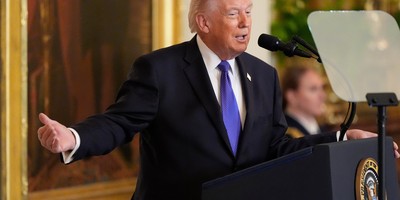Despite the presence of American troops, Iraq is in its seventh year of a "religious cleansing" against its native Christian, Yizidi, and Mandean populations, while its handful of remaining Jews are now desperately trying to flee after being identified by Wikileaks. Those who do not conform to prevailing religious orthodoxies are also targeted individually: For example, in Iran, apostasy charges threaten the life of a Christian pastor. This year, Pakistan's minister of minorities and the governor of Punjab were separately gunned down for defending those imprisoned under a harsh blasphemy law.
It is this moment that the U.S. Senate has chosen to quietly shut down the independent U.S. Commission on International Religious Freedom. USCIRF's mandate was to expire at the end of last month, but it was given a short reprieve through the continuing resolution on the budget. Meanwhile, on Sept. 15, the House of Representatives, in a 391-21 vote, overwhelmingly passed H.R. 2867 to reauthorize USCIRF for two more years. In the Senate, H.R. 2867 was poised to pass under a unanimous consent agreement when a single senator anonymously called it back for undisclosed reasons. If that secret hold is not lifted by Nov. 18, the Senate will not be able to act and USCIRF will go out of existence.
USCIRF was created in 1998 under the International Religious Freedom Act, an initiative of Rep. Frank Wolf (R., Va.). It was overwhelmingly adopted by both chambers and signed into law by President Clinton. Its mandate was born of the concern that, when it comes to religion issues in foreign affairs, the foreign-policy establishment, the media, and secular human-rights groups have been inattentive at best. In contrast to the State Department's own religious freedom office, USCIRF is an independent agency. It names the world's worst religious persecutors and makes non-binding foreign-policy recommendations to the government. Its inter-faith group of nine commissioners (full disclosure: I am one of them) are appointed on a bipartisan basis.
Recommended
At $4 million, its budget is a fraction of the U.S. Institute for Peace's, which also is funded by Congress; it rents a modest suite of offices for its staff, and its commissioners receive no remuneration for their time. Nevertheless, USCIRF is distinguished as a bold voice within the government and has seen important accomplishments. It pushed the Bush administration to understand the north-south conflict in Sudan as primarily a religious one, and not merely a fight over resources; this led to specific policies that resulted in the secession of South Sudan this past July and political independence and religious freedom for its people. It got the State Department to designate as "egregious" persecutors China, Saudi Arabia, and Uzbekistan. It keeps the focus on religious atrocities in places like Vietnam, Pakistan, Iraq and Egypt, even when the State Department does not.
USCIRF was the first official body to recognize the terrible plight of Iraq's minorities, and to speak up for the Copts; it is now pushing for some of America's aid to Egypt to be used to protect this endangered group. Five years ago, it was the first to take official notice of Saudi textbooks inciting religious violence; influenced by USCIRF prodding, the State Department has decided this year to take a look for itself inside these texts. Recently, USCIRF identified key Iranian authorities responsible for religious persecution and succeeded in having them denied visas. In Nigeria, its insistent appeals to end legal impunity, impressed on its leaders in repeated visits by USCIRF delegations headed by chair Leonard Leo, led this year to the first convictions in sectarian strife that has killed thousands over the past decade.
When we recently traveled to Riyadh to meet with Saudi ministers of education, justice and Islamic affairs, we found that every other American there on official business represented the oil industry, the military, or counterterrorism interests. Those are all important things, of course, but it occurred to me: USCIRF's biggest contribution may simply be representing in the darkest, most closed corners of the world America's bedrock belief -- the individual's unalienable right to religious freedom. USCIRF is one reliable voice within the government that does not find the issue of religious freedom too sensitive to bring up with foreign potentates.
In this, USCIRF is unique. Canada, the Netherlands, Germany and the Philippines are now examining its model. Other world democracies may soon follow America's lead -- this month, the European Union called for its member states to adopt specific guidelines on the defense of freedom of religion and belief abroad, citing in particular the repression of religious minorities and persecution from apostasy laws. It would be ironic indeed if the U.S. Senate were to unilaterally give up a key American instrument in the global contest of ideas, just as other parts of the free world are starting to catch on to the importance of religious freedom.
In establishing USCIRF, a broad inter-faith coalition prevailed over a well-padded trade lobby and influential establishment figures such as then-Secretary of State Madeleine Albright (who has since recanted her opposition). The American people need to remind their senators of the importance of religious freedom in foreign policy and of USCIRF's key role in this.
Nina Shea is director of the Hudson Institute's Center on Religious Freedom and a member of the United States Commission on International Religious Freedom. She is the co-author with Paul Marshall of the forthcoming "Silenced: How Apostasy and Blasphemy Codes are Choking Freedoms Worldwide" (Oxford University Press).
Copyright (c) 2011 Southern Baptist Convention, Baptist Press www.BPNews.net
























Join the conversation as a VIP Member